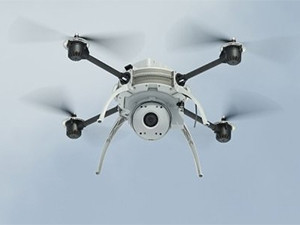
Drones are the latest technology predicted to replace a significant amount of traditionally human-held jobs.
The fear that robots will eventually take over is long-standing, and a new report by PricewaterhouseCoopers (PwC), "Clarity from above", fuels these insecurities. It predicts drone-powered solutions will likely replace over $127 billion worth of human labour in the near future.
Last week, Reuters reported that technology taking over jobs was a popular topic at the Milken Institute's Global Conference in California. Speakers said automation leads to higher quality and fewer errors, but in many cases also reduces labour.
The PwC report looks at the commercial applications of drone technology, examining industries like agriculture, security, transport and filmmaking.
PwC says each industry has diverse needs, and as a consequence, require different types of drone-powered solutions and various drone functionalities. Some value flight speed and payload capacity, while others concentrate on solutions delivering high-quality, real-time data in a cost-effective way.
"Drones are making the transition from novelty item to indispensable business tool," says Michal Mazur, head of drone-powered solutions at PwC for Central and Eastern Europe.
The report states the addressable market value of drone-powered solutions is over $127 billion. This is the value of current business services and labour that are likely to be replaced in the very near future by drone-powered solutions, according to PwC predictions.
The predicted value of drone-powered solutions in key industries, global view:
Infrastructure | $45.2 billion |
Agriculture | $32.4 billion |
Transport | $13 billion |
Security | $10 billion |
Media and entertainment | $8.8 billion |
Insurance | $6.8 billion |
Telecommunication | $6.3 billion |
Mining | $4.4 billion |
Total | $127.3 billion |
Drones need operators
Analysts say there is no cause for panic as technology advances, and 'human-held' jobs are replaced and automated, as there will always be a need for human operation and maintenance.
Adrian Schofield, ICT analyst, says: "One drone delivering parcels probably provides as much work for the operator as a courier van does for a driver."

However, because drones perform certain tasks in an aerial environment cheaply and quickly, says Schofield, the customer will receive their package faster while allowing the operator to deliver more.
Dion Chang, CEO of Flux Trends, says he has been tracking the use of drones for a long time. He believes drones will replace some jobs, but there will be a displacement of the workforce over time.
"I was asked recently by an investor if I would recommend investing in an aeronautical company, and I said a better investment would be a drone repairing company."
The rise of machines and job automation has long been discussed, but we are now fast approaching the tipping point, notes Chang.
He says it will start with algorithms this year, with the service and call centre industry the first to notice. Chang predicts the impact of drones will be felt by as early as next year.
Drone design and technology have improved massively within the last 24 months and will continue to do so, says Chang.
Schofield says drone technology is not new and has been used in the military sphere and toy market for many years.
"What has matured relatively recently is the middle market, with improvements in fuel systems/battery life, navigation software and lifting capacity. As so often happens with technology, give people a tool and they will find ways to use it - often ways the designers did not have in mind."
Schofield says there are many issues that need to be explored around the growth in usage of drones.
"There must be effective regulation of flight paths, for example. We have already seen instances of conflict between drones and other aircraft - how will we manage conflict between drones? How safe are the people on the ground when a drone falls out of the sky? How secure are the radio frequencies that control their navigation? Will we see hijacking of drones? Will drone operators have to be insured, licensed?" asks Schofield.
Last year, SA was one of the first countries in the world to enact regulation surrounding commercial drone use.
Africa applications
Emerging markets will benefit massively from drone technology, says Chang, especially in the agriculture sector.
He cites a seminar in Namibia, where he spoke to business people who were mostly also part-time farmers: "You could see the lightbulbs turn on in the room when I explained that drones are being used to distribute pesticide and other uses.
"Data-driven agriculture will completely change the way we farm, and suddenly this made huge sense to the Namibian farmers."
Another disruptive drone application for emerging markets will be medicine distribution to rural areas, says Chang.
Some countries are taking notice: "Rwanda recently said they would build three specialised drone ports to be ready by 2020.
"Often things like robotics seems a bit too futuristic for emerging markets," says Chang, but drone technology will make a tangible difference to a variety of industries.
Flying high
There have been a number of examples in the news recently of how drones are already being used in industry locally and globally.
In March, Kruger National Park and various partners announced they would invest R16 million in drone technology to fight poaching.
This week, international delivery company UPS said it would back a start-up that uses drones in Rwanda to transport life-saving supplies of blood and vaccines to rural areas.
In April, Australia Post successfully field-trialled the use of drones to deliver small packages.
As far back as 2013, online retailer Amazon said it was testing delivery using drones, and Google has promised such a service by 2017. Retailer Walmart is also testing drones.
Share